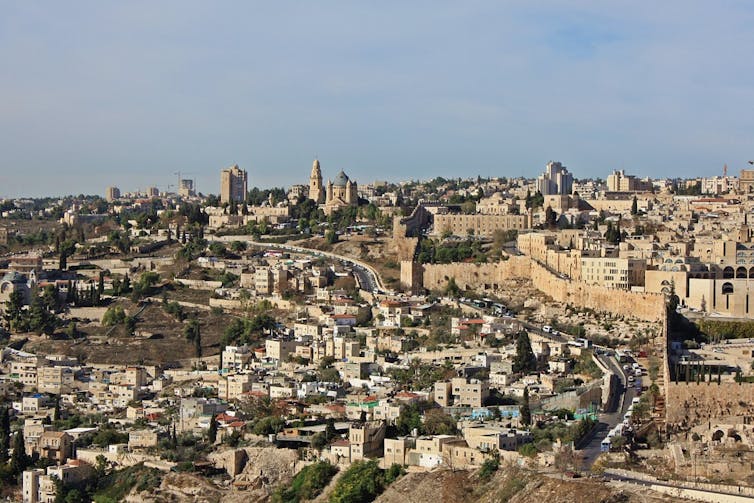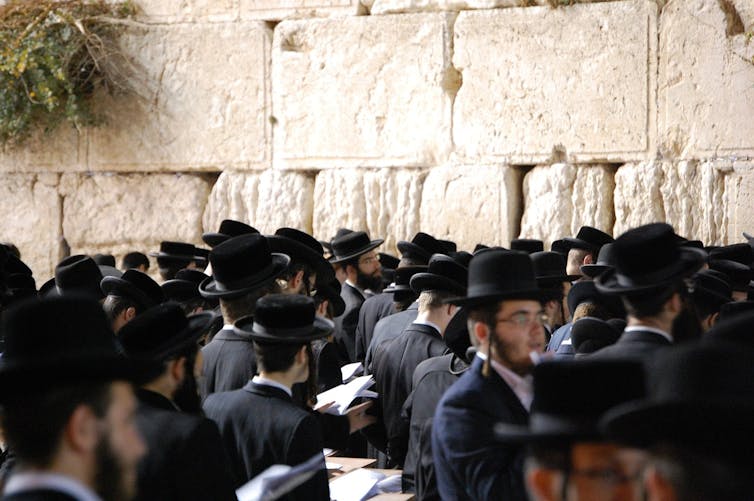Editor’s note: Professor Dan Arbell of American University, who spent 25 years in the Israeli Foreign Service, answers five questions about Jerusalem, which President Donald Trump recently recognized as the capital of Israel.
1. What is Jerusalem like today?
Jerusalem has a growing high-tech sector, a diverse, multicultural and multiethnic population, and bustling business centers and marketplaces that attract millions of touristsannually. Jerusalem is situated in a mountainous region, at 2,650 feet above sea level, overlooking the Judean Desert on one side and the Mediterranean coast on the other side. Jerusalem’s view and landscape are majestic.

What strikes first-time visitors to the city is the rare contrast between ancient and modern elements. In the east, the Old City of Jerusalem is surrounded by a fortified stone wall, built during the rule of the Ottoman Empire between the 16th to 20th centuries. The Old City contains narrow, stone cobbled alleys, colorful small shops of mostly Palestinian merchants, selling anything from jewelry, to backgammon sets, to fruit and coffee with wonderful aroma. In the west is a modern city, with high-rise stone buildings, a bustling business center, beautiful green parks and the newly opened Light Rail system, which serves all parts of the city.
In the east, Palestinians wear traditional clothing, mixed with youngsters in modern American and European style clothing. In the west, it’s mostly Jews of all denominations: from the ultra-Orthodox dressed in traditional gear influenced by biblical commandments and modesty requirements, to secular Jews who dress like many others in the Western world.
Security in Jerusalem is paramount, as every small incident in the city may turn into an international crisis. Therefore, Israeli security agencies, mostly Israeli police, maintain a strong presence in the city, especially during sensitive periods.

2. Why is Jerusalem so important?
Jerusalem is holy to the world’s three monotheistic religions and therefore important to hundreds of millions of people around the world.
For Christians it is the place where Jesus lived, preached and presumably died.
For Muslims it is the site of Haram al-Sharif, or Al-Aqsa Mosque, from which the Prophet Muhammad ascended to the sky.
For Jews it has been the main center of worship for centuries. It is the place where King Solomon’s Temple was destroyed in 586 B.C., rebuilt and destroyed by the Romans in 70 A.D. The temple housed the “Holy of Holies,” the inner sanctuary where, according to Jewish belief, God dwelt. What remains is the Temple’s Western Wall, Judaism’s most sacred place today.
3. How long has Jerusalem been a disputed territory?
The birth of Zionism in Europe in the late 19th century led to a concentrated effort by Jews to return to their ancient homeland after a 2,000-year exile. This effort was accompanied by a broad advocacy campaign across Europe to convince leaders to support the Zionist quest of establishing a Jewish national home in Palestine. These efforts paid off in November 1917, when the British government issued the Balfour Declaration, supporting the “establishment in Palestine of a national home for the Jewish people.”
In the years that followed, under British rule, the idea of establishing a full fledged independent Jewish state evolved. While not being the primary reason, World War II and the horrific and atrocious years of the Holocaust galvanized international support for a Jewish homeland.
In 1947, the U.N. called for the establishment of two states, Arab and Jewish, in the territory of Mandatory Palestine. It referred to Jerusalem as a “separate entity,” to be governed by a special international regime. The Jews accepted the plan, but the Arabs rejected it. Israelis declared their statehood in May 1948 – only to see the newly established state invaded by five Arab armies. As Israel emerged victorious from the 1948 war, it established its capital in West Jerusalem, which was in Israeli territory. East Jerusalem was in Jordanian territory.
Both Israelis and Palestinians declared their right to establish their capital in Jerusalem. For Jews, Jerusalem is a symbol of the return to Zion, their ancient homeland. It is not only a religious symbol, but also a symbol of Jewish sovereignty. For Palestinians, Jerusalem is equally important, as both a religious and political symbol.
In the 1967 war, Israel gained control of East Jerusalem, and declared the city in its entirety, as the “undivided, eternal” capital of Israel and the Jewish people. The Arab world and Palestinians categorically rejected Israel’s declaration and remain strongly opposed to it. Since 1967, the Christian and Muslim holy sites in Jerusalem are administered by the Israeli government, a sensitive issue in the Middle East in particular.
Indeed, the international community hasn’t recognized Jerusalem as the capital of Israel and still views the city as disputed territory. It has long been considered an issue that must be settled between Israelis and Palestinians in the context of peace negotiations. As a result, all foreign embassies operate from the city of Tel Aviv in Israel.
Nevertheless, in 1980, the Israeli Parliament, the Knesset, enacted the Jerusalem Basic Law, which stipulates that Jerusalem, “complete and united” is the capital of Israel.
There are no physical barriers between East and West Jerusalem. Israel’s executive, legislative and judicial branches are in Jerusalem and so are the president’s house and the prime minister’s office. According to the latest census, held in 2015, Jerusalem is home to a total of 865,000 residents, comprised of 62.6 percent Jews, 37.4 percent Arabs.
4. Why did Trump choose this timing to make his decision?
Trump’s announcement on Dec. 6, 2017, seemed to be based on mostly domestic political considerations.
First, he was delivering on a pledge he made during the presidential campaign, breaking from past presidents who as candidates promised to move the U.S. Embassy from Tel Aviv to Jerusalem, but never followed through.
Second, he was playing to core constituencies which support him, mainly evangelical Christians, who were pressing for this move.
Third, it was a sign of support to the Jewish state, as he and others close to him have spoken about his personal appreciation and friendship towards Israel.
Fourth, Trump argued that not recognizing Jerusalem for decades has not led to peace, so perhaps an official recognition would stir things up and revive an effort to reach peace between Israelis and Palestinians.
5. How will the peace process proceed now?
Trump’s decision drew harsh reactions from world leaders like French President Emmanuel Macron, German Chancellor Angela Merkel, Muslim leaders, such as Turkish President Recep Tayyip Erdoğan, Arab capitals, Palestinian leadership and people on the street. The European Union has urged for renewed efforts to advance a peace process between Israelis and Palestinians, and in light of Trump’s announcement has attempted to adopt as policy a recognition of East Jerusalem as the capital of the future Palestinian state, but to no avail. The Palestinians are now taking their case to the United Nations General Assembly.
It is difficult to see how, in the short term, Palestinians will be willing to cooperate with the Trump administration in its efforts to advance peace. Trump and his senior advisers dealing with the Middle East have hinted in recent weeks that a new peace plan will be introduced in the near future to the parties to the conflict. In the aftermath of the Jerusalem announcement, it is likely that the American effort will be placed on the “back burner” for some time to allow Arabs and Palestinians a cooling off period.
While Trump’s move can be viewed as very pro-Israel, the president left the door open for the possibility of future negotiations. He stated his support for the two-state solution “if agreed by the parties”, and emphasized that by officially recognizing Jerusalem as the capital, the U.S is not taking a position on final status issues, including the “specific boundaries of the Israeli sovereignty in Jerusalem,” as these issues will be determined in the context of future negotiations.
The emerging close ties between Israel and Sunni Arab regimes, mainly in the Gulf, strongly supported by the Trump administration, are also being put to the test. It is an open question whether Saudi Arabia, the United Arab Emirates, Egypt and Jordan will play along and pressure the Palestinians to return to negotiations with Israel, despite the announcement.
Author:Dan Arbell: cholar-in-residence at the Center for Israeli Studies , American University
Credit link:https://theconversation.com/a-former-israeli-diplomat-answers-5-questions-about-jerusalem-88922<img src="https://counter.theconversation.com/content/88922/count.gif?distributor=republish-lightbox-advanced" alt="The Conversation" width="1" height="1" />

